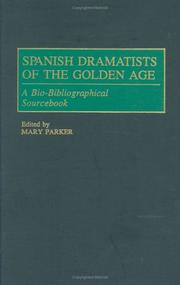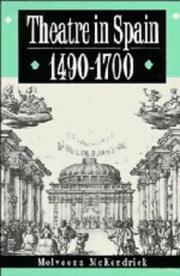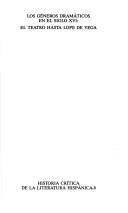| Listing 1 - 10 of 31 | << page >> |
Sort by
|
Book
ISBN: 8432076031 9788432076039 Year: 1974 Volume: 3 Publisher: Barcelona Planeta
Abstract | Keywords | Export | Availability | Bookmark
 Loading...
Loading...Choose an application
- Reference Manager
- EndNote
- RefWorks (Direct export to RefWorks)
Book
ISBN: 0521202949 9780521202947 Year: 1974 Publisher: London
Abstract | Keywords | Export | Availability | Bookmark
 Loading...
Loading...Choose an application
- Reference Manager
- EndNote
- RefWorks (Direct export to RefWorks)
Thematology --- Spanish literature --- Drama --- anno 1500-1599 --- Spanish drama --- Women in literature --- History and criticism --- Spanish drama - Classical period, 1500-1700 - History and criticism
Book
ISBN: 8430625097 9788430625093 Year: 1988 Volume: 9 Publisher: Madrid Taurus
Abstract | Keywords | Export | Availability | Bookmark
 Loading...
Loading...Choose an application
- Reference Manager
- EndNote
- RefWorks (Direct export to RefWorks)
Book
ISBN: 8424919904 9788424919900 Year: 1999 Volume: 413 Publisher: Madrid Gredos
Abstract | Keywords | Export | Availability | Bookmark
 Loading...
Loading...Choose an application
- Reference Manager
- EndNote
- RefWorks (Direct export to RefWorks)

ISBN: 0313288933 Year: 1998 Publisher: Westport, Conn. London Greenwood Press
Abstract | Keywords | Export | Availability | Bookmark
 Loading...
Loading...Choose an application
- Reference Manager
- EndNote
- RefWorks (Direct export to RefWorks)
Multi
ISSN: 22123091 ISBN: 9789004234567 9789004263017 9004263012 1306493498 9781306493499 900423456X Year: 2014 Volume: 2 Publisher: Leiden Brill
Abstract | Keywords | Export | Availability | Bookmark
 Loading...
Loading...Choose an application
- Reference Manager
- EndNote
- RefWorks (Direct export to RefWorks)
A panoramic, state-of-the-art handbook destined to chart a course for future work in the field of early modern Hispanic theater studies. It begins in the closet with an essay on Celestina as closet drama and moves out into the court to explore intersections with courtly love. An essay on the comedia and the classics demonstrates this genre’s firm grounding in the classical tradition, despite Lope de Vega’s famous protestations to the contrary. Distinct but related genres such as the autos sacramentales and the entremeses also make an appearance. The traditional themes of honor and wife-murder share the stage with less familiar topics like the incorporation of animals into performance. This volume covers the urban space of the city in Spain and Portugal as well as uncharted territories in the New World and Japan. Essays on emblems and the picaresque round out this anthology, along with studies of theatrical representations of early modern innovations in science and technology. The book concludes with two different psychoanalytical approaches, focused on melancholy and Lacanian tragedy, respectively. This collection incorporates the work of younger scholars along with established names in the field to synthesize the most exciting recent work on the comedia and related forms of early modern Hispanic theatrical production. Contributors include: Ignacio Arellano, Frederick de Armas, Henry Sullivan, Edward Friedman, A. Robert Lauer, Manuel Delgado, Adrienne Martín, Enrique García Santo Tomás, Matthew Stroud, Teresa Scott Soufas, Enrique Fernández, María Mercedes Carrión, Robert Bayliss, Ted Bergman, Cory Reed, Maryrica Lottman, Christina Lee, and Enrique Duarte.
drama [literature] --- Drama --- literature [writings] --- Spanish literature --- Spanish Renaissance-Baroque styles --- anno 1500-1599 --- Spanish drama --- History and criticism --- History and criticism. --- Spanish drama - Classical period, 1500-1700 - History and criticism --- drama [discipline] --- literature [documents]
Book
ISBN: 9781472441898 9781315594101 9781317100010 9781317100027 1472441915 1472441893 1472441907 Year: 2015 Volume: *2 Publisher: Farnham Ashgate
Abstract | Keywords | Export | Availability | Bookmark
 Loading...
Loading...Choose an application
- Reference Manager
- EndNote
- RefWorks (Direct export to RefWorks)
Masculine Virtue in Early Modern Spain extricates the history of masculinity in early modern Spain out of the narrative of Spain's fall from imperial power after 1640. This book culls genres as diverse as emblem books, poetry, drama, courtesy treatises, and prose fiction, to restore the inception of courtiership at the Spanish Hapsburg court to the history of masculinity. Refuting the current conception that Spain's political decline precipitated a "crisis of masculinity," Masculine Virtue maps changes in figurations of normative masculine conduct from 1500 to 1700. As Spain assumed the role of Europe's first modern centralized empire, codes of masculine conduct changed to meet the demands of global rule. Viewed chronologically, Shifra Armon shows Spanish conduct literature to reveal three axes of transformation. The ideal subject (gendered male in both practice and law) became progressively more adaptable to changing circumstances, more secretive, and more desirous of achieving renown. By bringing recent advances in gender theory to bear on normative rather than non-normative masculinities of early modern Spain, Armon is able to foreground the emergence of energizing new models of masculine virtue that continue to resonate today. -- from back cover.
Thematology --- Spanish literature --- Drama --- anno 1600-1699 --- anno 1500-1599 --- Spanish drama --- Masculinity in literature. --- Masculinity (Psychology) in literature --- History and criticism. --- Masculinity in literature --- History and criticism --- Spanish drama - Classical period, 1500-1700 - History and criticism

ISBN: 0521355923 9780521355926 Year: 1989 Publisher: Cambridge Cambridge University Press
Abstract | Keywords | Export | Availability | Bookmark
 Loading...
Loading...Choose an application
- Reference Manager
- EndNote
- RefWorks (Direct export to RefWorks)
Spanish literature --- Theatrical science --- Drama --- anno 1500-1799 --- Spain --- Spanish drama --- Theater --- History and criticism --- History --- Classical period, 1500-1700 --- Spanish drama - Classical period, 1500-1700 - History and criticism. --- Theater - Spain - History.
Book
ISBN: 9781433130083 1433130084 Year: 2015 Volume: 44 Publisher: New York, N.Y. Peter Lang
Abstract | Keywords | Export | Availability | Bookmark
 Loading...
Loading...Choose an application
- Reference Manager
- EndNote
- RefWorks (Direct export to RefWorks)
This volume, organized in five major sections, honors the myriad scholarly contributions of Matthew D. Stroud to the field of Early Modern Spanish theater. Building upon Stroud’s seminal studies, each section of essays simultaneously claims and wrestles with aspects of the rich legacy generated by his explorations. The essays included in this volume consider the moral, ethical, and legal backdrop of uxoricide, explorations of the meaningful intersections of psychoanalytic theory and the comedia, and engage the topics of women, gender, and identity. They also bridge the gap between dramatist and actors and between page and stage as they consider everything from the physical demands on Early Modern actresses to the twenty-first-century performance possibilities of comedias. Moreover, these essays incorporate studies that transcend temporal, spatial, political, and cultural limits, continuing to push at the edges of traditional scholarship characteristic of Stroud’s pioneering research. Both scholars and students will find this cohesive, compelling collection of interest across a wide spectrum of disciplines from theater history to performance studies, from philosophy to queer studies
Spanish literature --- Drama --- anno 1600-1699 --- anno 1500-1599 --- Spanish drama --- Theater --- History and criticism. --- History --- Spanish drama - Classical period, 1500-1700 - History and criticism. --- Theater - Spain - History - 16th century. --- Theater - Spain - History - 17th century.

ISBN: 8430625089 9788430625086 Year: 1990 Volume: 8 Publisher: Madrid Taurus
Abstract | Keywords | Export | Availability | Bookmark
 Loading...
Loading...Choose an application
- Reference Manager
- EndNote
- RefWorks (Direct export to RefWorks)
| Listing 1 - 10 of 31 | << page >> |
Sort by
|

 Search
Search Feedback
Feedback About UniCat
About UniCat  Help
Help News
News